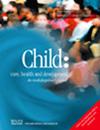The Impact of Perceived Self-Efficacy on Healthcare Transition Outcomes: Perceptions From Parents and Young People
Abstract
Background
Adolescent and young adults (AYAs) with a chronic health condition face multiple challenges as they transition from paediatric to adult healthcare. To facilitate engagement during healthcare transition, one supportive psychological skillset is health self-efficacy. Outcomes that indicate engagement during healthcare transition involve transition readiness, lower distress, quality of life and general adherence. Although researchers have examined the impact of youth self-efficacy on engagement during healthcare transition, studies are yet to examine the impact of parent-perceived self-efficacy during healthcare transition. The current study aimed to investigate how youth self-efficacy and parent-perceived self-efficacy impacted indicators of engagement during healthcare transition.
Method
Participants were 54 AYAs and 48 parents who were recruited from The Centre for Adolescent and Young Adult Health at Westmead Hospital. Participating AYAs ranged in age from 12 to 25 years old (M = 17.74, SD = 2.56, Mdn = 17.08). Adolescents completed scales examining health self-efficacy, distress, health-related quality of life and general adherence to treatment. Parents completed scales examining AYAs' health self-efficacy and transition readiness from paediatric to adult healthcare.
Results
Uniquely, findings have demonstrated that parent-perceived self-efficacy holds most value in predicting transition readiness. Conversely, youth self-efficacy holds most value in predicting general adherence.
Conclusion
Both perspectives hold great importance for different outcomes. To promote successful healthcare transition and general adherence, self-efficacy interventions that involve AYAs and parents would be beneficial.

 求助内容:
求助内容: 应助结果提醒方式:
应助结果提醒方式:


